人教版(2019)必修第一册 Unit 5 Languages Around the World Grammar定语从句语法课件(共22张PPT)
文档属性
| 名称 | 人教版(2019)必修第一册 Unit 5 Languages Around the World Grammar定语从句语法课件(共22张PPT) | 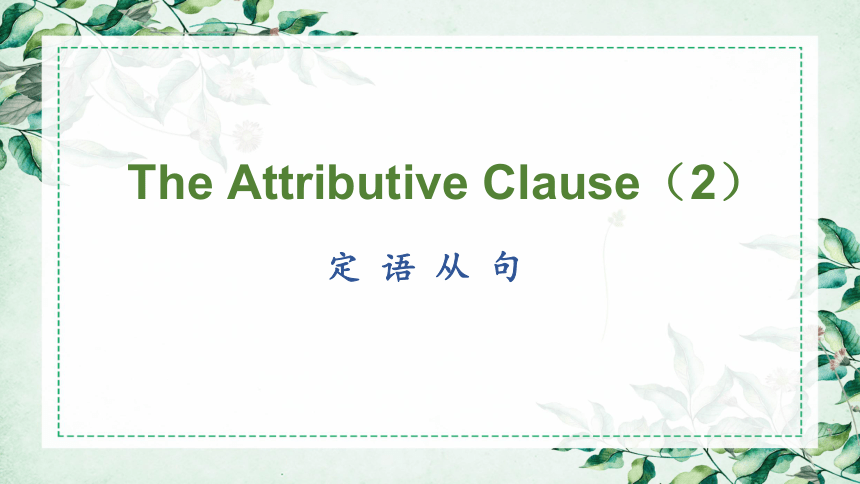 | |
| 格式 | pptx | ||
| 文件大小 | 2.6MB | ||
| 资源类型 | 教案 | ||
| 版本资源 | 人教版(2019) | ||
| 科目 | 英语 | ||
| 更新时间 | 2023-11-10 11:50:57 | ||
图片预览

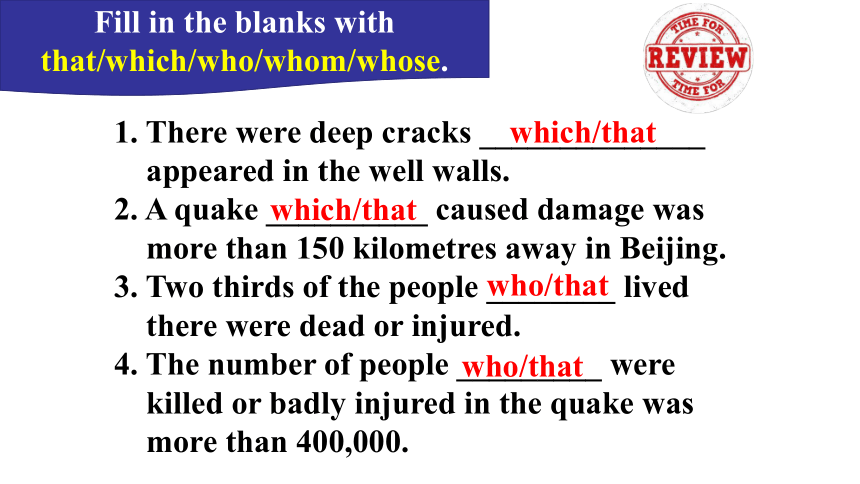
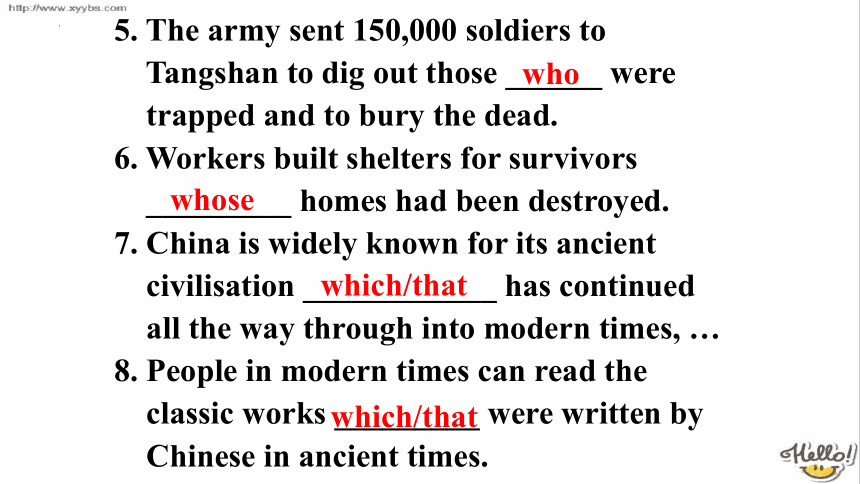
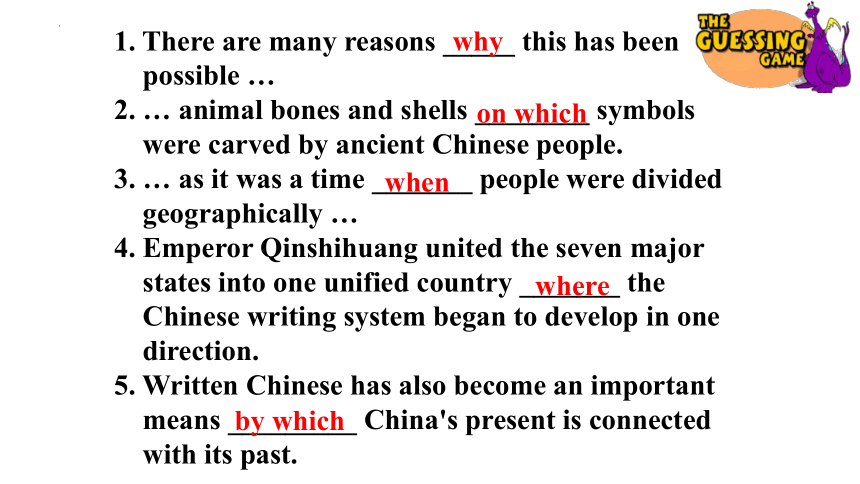
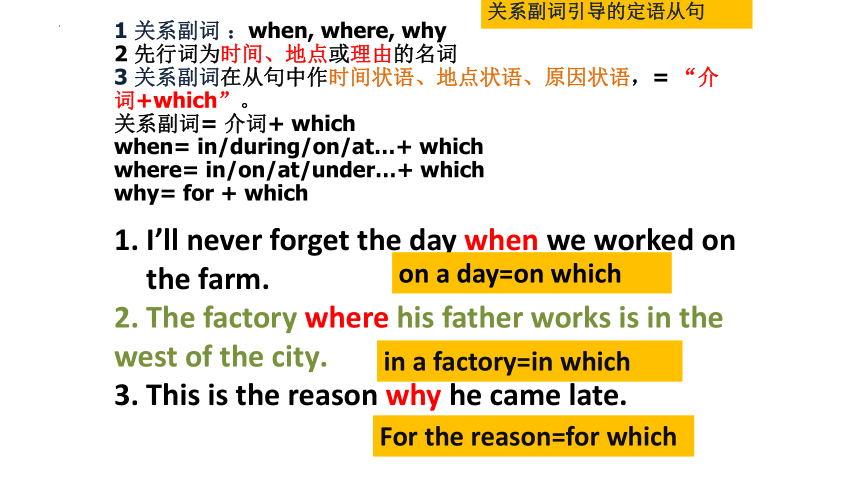
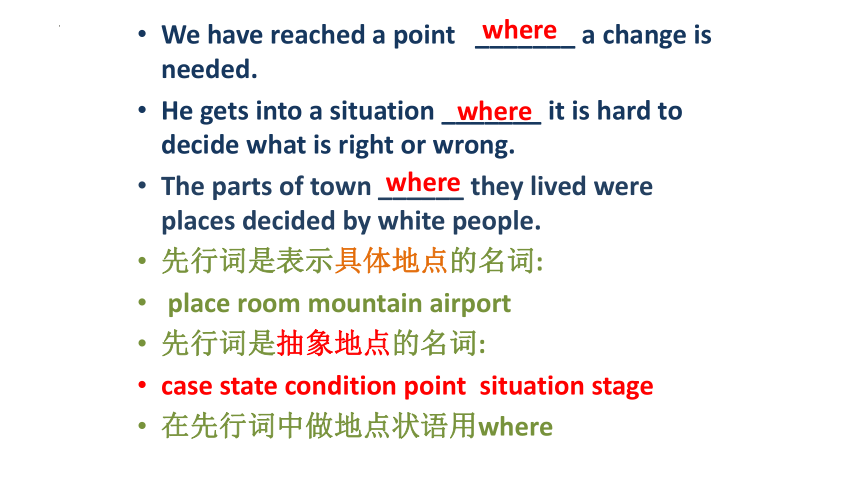
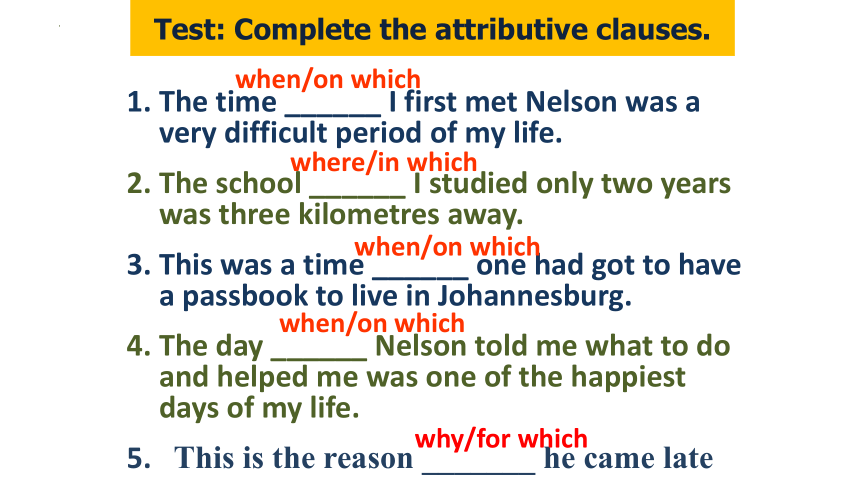
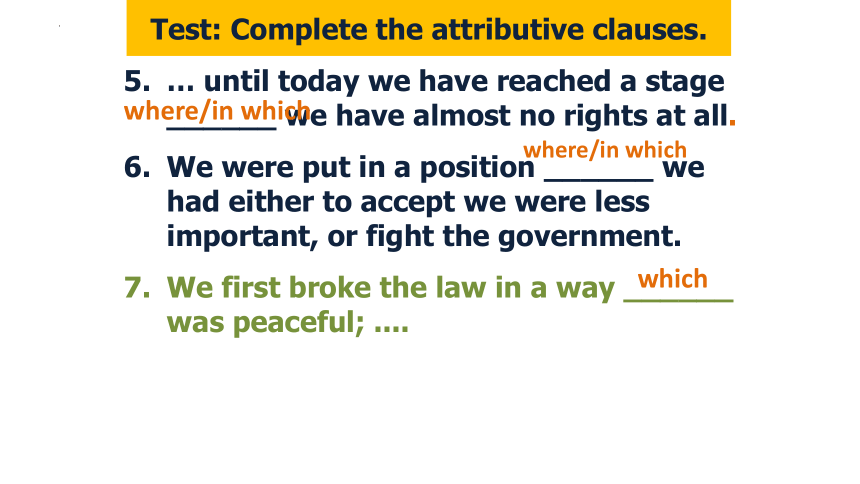
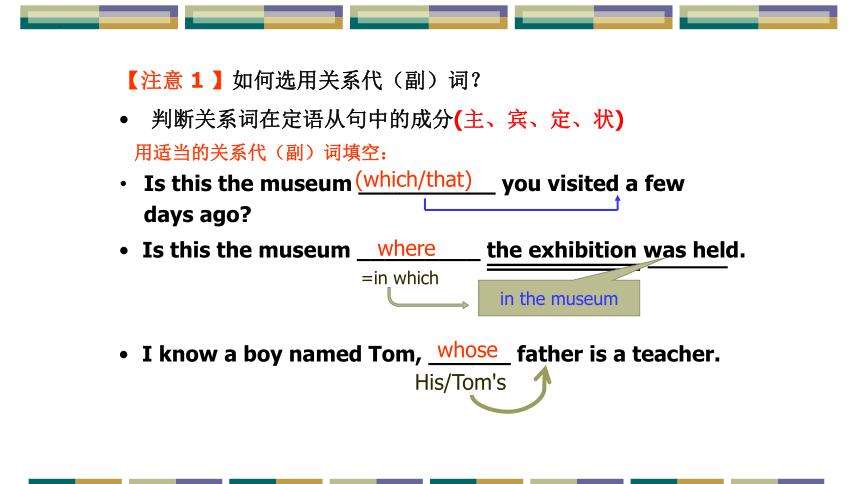
文档简介
(共22张PPT)
The Attributive Clause(2)
定 语 从 句
Fill in the blanks with that/which/who/whom/whose.
1. There were deep cracks ______________
appeared in the well walls.
2. A quake __________ caused damage was
more than 150 kilometres away in Beijing.
3. Two thirds of the people ________ lived
there were dead or injured.
4. The number of people _________ were
killed or badly injured in the quake was
more than 400,000.
which/that
which/that
who/that
who/that
5. The army sent 150,000 soldiers to
Tangshan to dig out those ______ were
trapped and to bury the dead.
6. Workers built shelters for survivors
_________ homes had been destroyed.
7. China is widely known for its ancient
civilisation ____________ has continued
all the way through into modern times, …
8. People in modern times can read the
classic works _________ were written by
Chinese in ancient times.
which/that
which/that
who
whose
1. There are many reasons _____ this has been
possible …
2. … animal bones and shells ________ symbols
were carved by ancient Chinese people.
3. … as it was a time _______ people were divided
geographically …
4. Emperor Qinshihuang united the seven major
states into one unified country _______ the
Chinese writing system began to develop in one
direction.
5. Written Chinese has also become an important
means _________ China's present is connected
with its past.
why
on which
when
where
by which
1 关系副词 :when, where, why
2 先行词为时间、地点或理由的名词
3 关系副词在从句中作时间状语、地点状语、原因状语,= “介词+which”。
关系副词= 介词+ which
when= in/during/on/at…+ which
where= in/on/at/under…+ which
why= for + which
I’ll never forget the day when we worked on the farm.
2. The factory where his father works is in the west of the city.
3. This is the reason why he came late.
on a day=on which
in a factory=in which
For the reason=for which
关系副词引导的定语从句
We have reached a point _______ a change is needed.
He gets into a situation _______ it is hard to decide what is right or wrong.
The parts of town ______ they lived were places decided by white people.
先行词是表示具体地点的名词:
place room mountain airport
先行词是抽象地点的名词:
case state condition point situation stage
在先行词中做地点状语用where
where
where
where
Test: Complete the attributive clauses.
The time ______ I first met Nelson was a very difficult period of my life.
The school ______ I studied only two years was three kilometres away.
This was a time ______ one had got to have a passbook to live in Johannesburg.
The day ______ Nelson told me what to do and helped me was one of the happiest days of my life.
This is the reason _______ he came late
when/on which
where/in which
when/on which
when/on which
why/for which
… until today we have reached a stage ______ we have almost no rights at all.
We were put in a position ______ we had either to accept we were less important, or fight the government.
We first broke the law in a way ______ was peaceful; ....
where/in which
where/in which
which
Test: Complete the attributive clauses.
Is this the museum __________ you visited a few days ago
用适当的关系代(副)词填空:
(which/that)
where
Is this the museum _________ the exhibition was held.
【注意 1 】如何选用关系代(副)词?
判断关系词在定语从句中的成分(主、宾、定、状)
I know a boy named Tom, ______ father is a teacher.
whose
in the museum
=in which
His/Tom's
This is the mountain village ______ I stayed last year.
I'll never forget the days ______ I worked together with you.
Could you tell me the reason ______ he was late for the meeting
The factory __________ I am going to visit is the place __________ my mother used to work many years ago.
Exercise 1
用适当的关系代(副)词填空:
where/in which
when
why
(which/that)
where
1. He will never forget the day when his father was beaten to death.
【注意2】关系副词when, where, why含义相当于“介词+ which”
= in which
= in this place
2. Beijing is the place where I was born.
= on which
= on that day
3. This is the reason why he gave up the plan.
= for which
= for this reason
1. This is the museum _____________ we saw the other day.
2. This is the museum _____________ we saw an exhibition the other day.
(that/which)
where/in which
Exercise 4
用适当的关系代(副)词填空:
3. He has left for Beijing, ____________ a meeting will be held.
4. He has left for Beijing, ____________ is the capital of China.
where/in which
which
【注意 3 】关于介词提前
1. I’ll never forget the day on which we visited Hong Kong.
2. This is the reason for which he gave in to her.
Mandela was the black lawyer to whom I went for advice.
4. He was generous with his time, for which I was grateful.
(1)被提前的介词取决于先行词:
(2)被提前的介词取决于从句中的动词:
介词后不用that
1. This is the person _____ ______ we’ve got the news we need.
Have you seen the hill ____ top of ______ there is a big tree
The train____ _____ you can go to Shanghai leaves at 7 p.m.
Li Ming, _____ _____ I went to the exhibition, enjoyed it very much.
I’ve just bought the book ______ ______you often talked.
from whom
Exercise 5
on which
with whom
about which
介词 + 关系代词
on which
The factory ____ _____he works is in the west of the city.
I’ve borrowed a story-book ____ _____there are many interesting pictures.
I still remember the day ____ _____ I saw Mr. Smith for the first time.
This is the pen ____ ______ I wrote the letter to her.
Here are visitors from Japan, some ___ ______ are our old friends.
in which
in which
on which
with which
of whom
【注意 4 】从句中的一些固定短语的介词不可提前
The soldiers who were looked after well in the village recovered.
It’s the formality(手续)which we have to go through.
拆开后意思会改变的
短语的介词不可提前
He is a man of great knowledge, ___________ much can be learned.
The man _________ I told you about has gone to Japan.
This is one of the means _________ the electric energy is conducted from one place to another.
The vase __________ they dug out was made in Ming dynasty.
from whom
(whom)
Exercise 6
by which
(which/that)
(介词 + ) 关系代词
关系副词与关系代词的区分
The reason ___________ she gave was not true.
This is the reason _____________ I didn't come.
why/for which
指时间,地点或原因的先行词在定语从句中:
作状语时,用关系副词where/when/why等引导。
which/that
指时间,地点或原因的先行词在定语从句中:
作主语或宾语时,用关系代词which或that引导。
1. This is the place _______ he works.
This is the place ___________we visited
last year.
2. That was the time ______ he arrived.
Do you still remember the time _________ we spent together
3. This is the reason ____________ he went.
The reason ___________ he gave us was quite reasonable.
where
which/that
when
that/which
why/for which
that/which
Conclusion
part 4
Summary
定语从句解题三步骤
三“分析”
把先行词代入定从
分析先行词在定从中充当的成分
找出先行词
做主/ 宾/ 表/ 定,选择关系代词
一“找”
二“代”
做状语,
选择关系副词
主/宾/ 表;人/物
which
who
whose
that
whom
when
where
why
主/宾/ 表;物
主/宾/ 表;人
宾语;人
定语;人/物
时间状语
地点状语
原因状语
Complete the passage with the correct relative pronouns or adverbs below.
that when where (in) which who why
The United Nations(UN) is an organization ___________aims to promote international cooperation. It was founded in 1945 and has about 190 member states. This is the reason _______ the UN has a huge number of translators and interpreters, since international meetings in the UN are attended by people ___________ speak so many different languages. Translators are people ______ usually work with written language, while interpreters work with spoken language. Meetings _____________ only two languages are used may need only one interpreter, while larger events ______________ leaders from many countries gather may need over 70 interpreters.
that/ which
语境应用
why
where/ in which
who/ that
who/ that
where/ in which
The Attributive Clause(2)
定 语 从 句
Fill in the blanks with that/which/who/whom/whose.
1. There were deep cracks ______________
appeared in the well walls.
2. A quake __________ caused damage was
more than 150 kilometres away in Beijing.
3. Two thirds of the people ________ lived
there were dead or injured.
4. The number of people _________ were
killed or badly injured in the quake was
more than 400,000.
which/that
which/that
who/that
who/that
5. The army sent 150,000 soldiers to
Tangshan to dig out those ______ were
trapped and to bury the dead.
6. Workers built shelters for survivors
_________ homes had been destroyed.
7. China is widely known for its ancient
civilisation ____________ has continued
all the way through into modern times, …
8. People in modern times can read the
classic works _________ were written by
Chinese in ancient times.
which/that
which/that
who
whose
1. There are many reasons _____ this has been
possible …
2. … animal bones and shells ________ symbols
were carved by ancient Chinese people.
3. … as it was a time _______ people were divided
geographically …
4. Emperor Qinshihuang united the seven major
states into one unified country _______ the
Chinese writing system began to develop in one
direction.
5. Written Chinese has also become an important
means _________ China's present is connected
with its past.
why
on which
when
where
by which
1 关系副词 :when, where, why
2 先行词为时间、地点或理由的名词
3 关系副词在从句中作时间状语、地点状语、原因状语,= “介词+which”。
关系副词= 介词+ which
when= in/during/on/at…+ which
where= in/on/at/under…+ which
why= for + which
I’ll never forget the day when we worked on the farm.
2. The factory where his father works is in the west of the city.
3. This is the reason why he came late.
on a day=on which
in a factory=in which
For the reason=for which
关系副词引导的定语从句
We have reached a point _______ a change is needed.
He gets into a situation _______ it is hard to decide what is right or wrong.
The parts of town ______ they lived were places decided by white people.
先行词是表示具体地点的名词:
place room mountain airport
先行词是抽象地点的名词:
case state condition point situation stage
在先行词中做地点状语用where
where
where
where
Test: Complete the attributive clauses.
The time ______ I first met Nelson was a very difficult period of my life.
The school ______ I studied only two years was three kilometres away.
This was a time ______ one had got to have a passbook to live in Johannesburg.
The day ______ Nelson told me what to do and helped me was one of the happiest days of my life.
This is the reason _______ he came late
when/on which
where/in which
when/on which
when/on which
why/for which
… until today we have reached a stage ______ we have almost no rights at all.
We were put in a position ______ we had either to accept we were less important, or fight the government.
We first broke the law in a way ______ was peaceful; ....
where/in which
where/in which
which
Test: Complete the attributive clauses.
Is this the museum __________ you visited a few days ago
用适当的关系代(副)词填空:
(which/that)
where
Is this the museum _________ the exhibition was held.
【注意 1 】如何选用关系代(副)词?
判断关系词在定语从句中的成分(主、宾、定、状)
I know a boy named Tom, ______ father is a teacher.
whose
in the museum
=in which
His/Tom's
This is the mountain village ______ I stayed last year.
I'll never forget the days ______ I worked together with you.
Could you tell me the reason ______ he was late for the meeting
The factory __________ I am going to visit is the place __________ my mother used to work many years ago.
Exercise 1
用适当的关系代(副)词填空:
where/in which
when
why
(which/that)
where
1. He will never forget the day when his father was beaten to death.
【注意2】关系副词when, where, why含义相当于“介词+ which”
= in which
= in this place
2. Beijing is the place where I was born.
= on which
= on that day
3. This is the reason why he gave up the plan.
= for which
= for this reason
1. This is the museum _____________ we saw the other day.
2. This is the museum _____________ we saw an exhibition the other day.
(that/which)
where/in which
Exercise 4
用适当的关系代(副)词填空:
3. He has left for Beijing, ____________ a meeting will be held.
4. He has left for Beijing, ____________ is the capital of China.
where/in which
which
【注意 3 】关于介词提前
1. I’ll never forget the day on which we visited Hong Kong.
2. This is the reason for which he gave in to her.
Mandela was the black lawyer to whom I went for advice.
4. He was generous with his time, for which I was grateful.
(1)被提前的介词取决于先行词:
(2)被提前的介词取决于从句中的动词:
介词后不用that
1. This is the person _____ ______ we’ve got the news we need.
Have you seen the hill ____ top of ______ there is a big tree
The train____ _____ you can go to Shanghai leaves at 7 p.m.
Li Ming, _____ _____ I went to the exhibition, enjoyed it very much.
I’ve just bought the book ______ ______you often talked.
from whom
Exercise 5
on which
with whom
about which
介词 + 关系代词
on which
The factory ____ _____he works is in the west of the city.
I’ve borrowed a story-book ____ _____there are many interesting pictures.
I still remember the day ____ _____ I saw Mr. Smith for the first time.
This is the pen ____ ______ I wrote the letter to her.
Here are visitors from Japan, some ___ ______ are our old friends.
in which
in which
on which
with which
of whom
【注意 4 】从句中的一些固定短语的介词不可提前
The soldiers who were looked after well in the village recovered.
It’s the formality(手续)which we have to go through.
拆开后意思会改变的
短语的介词不可提前
He is a man of great knowledge, ___________ much can be learned.
The man _________ I told you about has gone to Japan.
This is one of the means _________ the electric energy is conducted from one place to another.
The vase __________ they dug out was made in Ming dynasty.
from whom
(whom)
Exercise 6
by which
(which/that)
(介词 + ) 关系代词
关系副词与关系代词的区分
The reason ___________ she gave was not true.
This is the reason _____________ I didn't come.
why/for which
指时间,地点或原因的先行词在定语从句中:
作状语时,用关系副词where/when/why等引导。
which/that
指时间,地点或原因的先行词在定语从句中:
作主语或宾语时,用关系代词which或that引导。
1. This is the place _______ he works.
This is the place ___________we visited
last year.
2. That was the time ______ he arrived.
Do you still remember the time _________ we spent together
3. This is the reason ____________ he went.
The reason ___________ he gave us was quite reasonable.
where
which/that
when
that/which
why/for which
that/which
Conclusion
part 4
Summary
定语从句解题三步骤
三“分析”
把先行词代入定从
分析先行词在定从中充当的成分
找出先行词
做主/ 宾/ 表/ 定,选择关系代词
一“找”
二“代”
做状语,
选择关系副词
主/宾/ 表;人/物
which
who
whose
that
whom
when
where
why
主/宾/ 表;物
主/宾/ 表;人
宾语;人
定语;人/物
时间状语
地点状语
原因状语
Complete the passage with the correct relative pronouns or adverbs below.
that when where (in) which who why
The United Nations(UN) is an organization ___________aims to promote international cooperation. It was founded in 1945 and has about 190 member states. This is the reason _______ the UN has a huge number of translators and interpreters, since international meetings in the UN are attended by people ___________ speak so many different languages. Translators are people ______ usually work with written language, while interpreters work with spoken language. Meetings _____________ only two languages are used may need only one interpreter, while larger events ______________ leaders from many countries gather may need over 70 interpreters.
that/ which
语境应用
why
where/ in which
who/ that
who/ that
where/ in which
